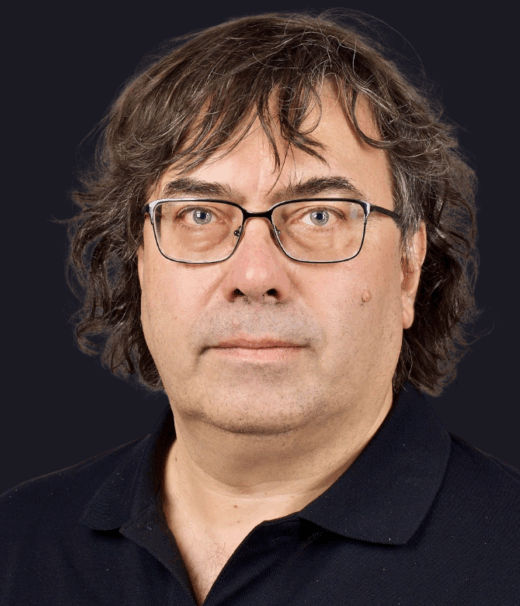Theory of Condensed Matter
Theoretical Condensed Matter physics is about building models of physical processes, often driven by experimental data, generalising the solutions of those models to make experimental predictions, and transferring the concepts gained into other areas of research. Theory plays an important role in understanding known phenomena and in predicting new ones.
With over seventy members, the TCM Group is one of the largest research Groups in the Cavendish Laboratory, and the largest university Condensed Matter Theory group in the country. Able to trace its history back for over sixty years, it has been home to many leading theoreticians.
Starting at the first principles microscopic level - with the Schrödinger equation - many properties of materials can now be calculated with a high degree of accuracy. We work on refining and developing new calculational tools and applying them to problems in physics, chemistry, materials science and biology.
Solids often show unusual collective behaviour resulting from cooperative quantum or classical phenomena. For this type of physics a more model-based approach is appropriate, and we are using such methods to attack problems in magnetism, superconductivity, nonlinear optics, mesoscopic systems, polymers, and colloids.
Collective behaviour comes even more to the fore in systems on a larger scale. As examples, we work on self-organising structures in "soft" condensed matter systems, non-linear dynamics of interacting systems, the observer in quantum mechanics, and models of biophysical processes, from the molecular scale up to neural systems.

TCM is delighted by the news that Prof Nicola Marzari has been elected as the next Cavendish Professor of Physics. Nicola will take up the chair from September, continuing his research on first-principles computational materials science, striving for ever more accurate predictions of real-world properties using a multitude of techniques, including machine learning.
We look forward to welcoming Prof Marzari back to Cambridge, and back to TCM, where he did his PhD.
News archive(Click the above tab to reload the Seminars list.)
More seminarsResonating valence bond spin liquid induced by kinetic energy frustration
Cecilie Glittum, Antonio Štrkalj, Dharmalingam Prabhakaran, Paul A. Goddard, Cristian D. Batista, Claudio Castelnovo
Excitonic topology and quantum geometry in organic semiconductors
Wojciech Jankowski, Joshua J.P. Thompson, Bartomeu Monserrat, Robert-Jan Slager
Adaptive locomotion of active solids
Jonas Veenstra, Colin Scheibner, Martin Brandenbourger, Jack Binysh, Anton Souslov, Vincenzo Vitelli, and Corentin Coulais.
Buckle-Barrel Correspondence Based on Topological Polarization Conversion in Mechanical Metamaterials
Jingyi Zhang, Jingran Liu, Anton Souslov, María Teresa Pérez Prado, Javier Segurado, Maciej Haranczyk, Johan Christensen
Optical manifestations and bounds of topological Euler class
Wojciech J. Jankowski, Arthur S. Morris , Adrien Bouhon, F. Nur Ünal and Robert-Jan Slager
All publications
Theoretical Condensed Matter physics is about building models of physical processes, often driven by experimental data, generalising the solutions of those models to make experimental predictions, and transferring the concepts gained into other areas of research. Theory plays an important role in understanding known phenomena and in predicting new ones.
With over seventy members, the TCM Group is one of the largest research Groups in the Cavendish Laboratory, and the largest university Condensed Matter Theory group in the country. Able to trace its history back for over sixty years, it has been home to many leading theoreticians.
Starting at the first principles microscopic level - with the Schrödinger equation - many properties of materials can now be calculated with a high degree of accuracy. We work on refining and developing new calculational tools and applying them to problems in physics, chemistry, materials science and biology.
Solids often show unusual collective behaviour resulting from cooperative quantum or classical phenomena. For this type of physics a more model-based approach is appropriate, and we are using such methods to attack problems in magnetism, superconductivity, nonlinear optics, mesoscopic systems, polymers, and colloids.
Collective behaviour comes even more to the fore in systems on a larger scale. As examples, we work on self-organising structures in "soft" condensed matter systems, non-linear dynamics of interacting systems, the observer in quantum mechanics, and models of biophysical processes, from the molecular scale up to neural systems.
News

TCM is delighted by the news that Prof Nicola Marzari has been elected as the next Cavendish Professor of Physics. Nicola will take up the chair from September, continuing his research on first-principles computational materials science, striving for ever more accurate predictions of real-world properties using a multitude of techniques, including machine learning.
We look forward to welcoming Prof Marzari back to Cambridge, and back to TCM, where he did his PhD.
Recent Publications
Resonating valence bond spin liquid induced by kinetic energy frustration
Cecilie Glittum, Antonio Štrkalj, Dharmalingam Prabhakaran, Paul A. Goddard, Cristian D. Batista, Claudio Castelnovo
Excitonic topology and quantum geometry in organic semiconductors
Wojciech Jankowski, Joshua J.P. Thompson, Bartomeu Monserrat, Robert-Jan Slager
Adaptive locomotion of active solids
Jonas Veenstra, Colin Scheibner, Martin Brandenbourger, Jack Binysh, Anton Souslov, Vincenzo Vitelli, and Corentin Coulais.
Buckle-Barrel Correspondence Based on Topological Polarization Conversion in Mechanical Metamaterials
Jingyi Zhang, Jingran Liu, Anton Souslov, María Teresa Pérez Prado, Javier Segurado, Maciej Haranczyk, Johan Christensen
Optical manifestations and bounds of topological Euler class
Wojciech J. Jankowski, Arthur S. Morris , Adrien Bouhon, F. Nur Ünal and Robert-Jan Slager
All publications




